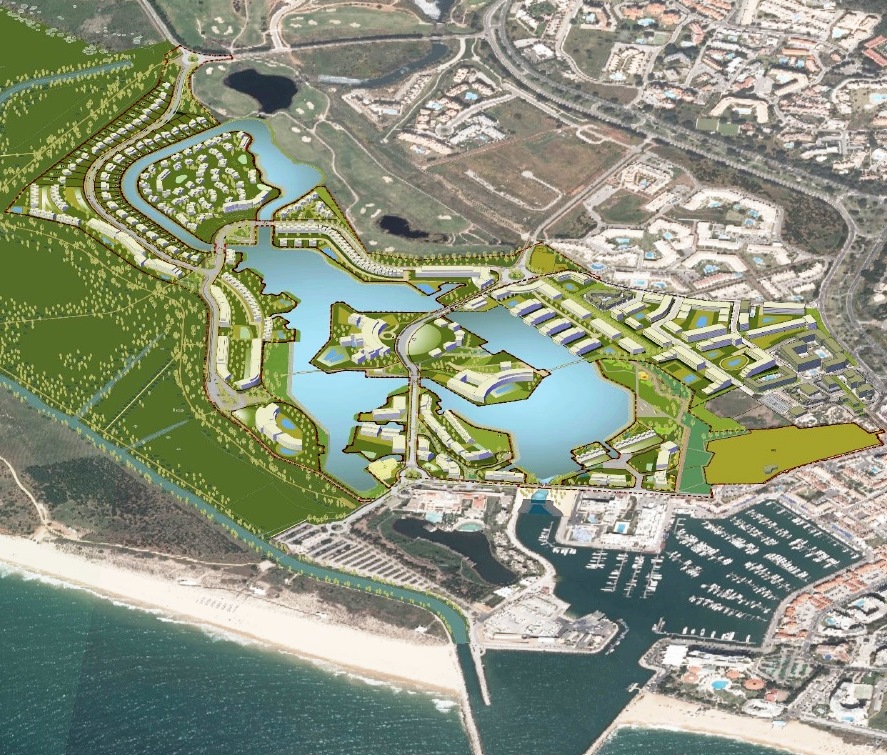Almargem says that the State must prevent the advance of Cidade Lacustre, in Vilamoura, a “retrograde project” that configures an “environmental attack”. If not, the association will consider a complaint with the European Commission.
In a statement, Almargem defends that the «State still has time to avoid the colossal error that would constitute the approval of the Cidade Lacustre project», believing this association that the State «has at its disposal the legal means and reasons to suspend projects such as this one, old and clearly out of step with the current reality».
Therefore, according to Almargem, there is no other “outcome for this project” than a “issuance of an Unfavorable Environmental Impact Statement by the Environmental Impact Assessment Committee”.
If this does not happen, Almargem «considers that this would constitute the assumption of a serious failure by the Portuguese State, for failure to comply with its obligation to protect areas for the conservation of habitats and species of fauna and flora, by endorsing the destruction of the Caniçal de Vilamoura, whose preservation should have been assumed as a priority, both for its contribution to the mitigation of climate change, and for its importance for numerous species of birds of community importance, and also for the preservation of a wetland that constitutes one of the zones. most important swamps for avifauna in the Algarve».
However, this position arises after this project has been in public consultation, after a period of suspension of six months to allow its reformulation.
The promoters of Cidade Lacustre, a mega-development of 57,4 hectares, with residences, tourist beds, restaurants and up to four lake areas, had six months to reformulate the project, so that it would meet the requirements of the CCDR , entity that justified the suspension of the EIA with the fact that there are "important gaps in the rationale and negative impacts identified in different environmental factors, such as the archaeological cultural heritage, landscape, biodiversity, territory, socio-economics, geotechnics or climate change".
"Despite this debatable decision, the project now evaluated has changed little or nothing, remaining incompatible with the rules of planning and the environment, as well as with the need to protect the natural and cultural heritage of that site, which is largely occupied by one of the biggest patches of reed beds in the country», says Almargem.
Conceived in the initial plan of Vilamoura, in the 1960s, «the 'new' city planned for what remains of the old Morgado da Quinta de Quarteira, only came off the ground in 1994, cherished by an exceptional dispatch that allowed this and more two other projects – Vale de Lobo III (Loulé) and Verdelago (Castro Marim) – were endorsed, despite the fact that they blatantly contradicted the legal rules in force, namely the approved Regional Land Use Plan for the Algarve (PROTAL). in 1991, but also the National Agricultural and Ecological Reserves (RAN and REN)».
Later in 2009, Cidade Lacustre had the first favorable Environmental Impact Statement (DIA), “in an intolerable dismemberment of the Environmental Impact Assessment process, which then concerned only the assessment of the so-called “Lakes and Infrastructures of the Cidade Lacustre de Vilamoura ”».
Three more decades later, and despite its clear maladjustment in the face of the extensive legal framework published in the meantime, namely the European Landscape Convention, the new PROT Algarve (approved in 2007), as well as in terms of safeguarding coastal areas and mitigating impacts of climate change, the Cidade Lacustre project is trying to be approved, "now under the pretext of the alleged national interest".
«Almargem considers that the Cidade Lacustre project is clearly (and literally) a project of the past, out of step with the present reality, which seems to ignore the future (climate change, rising sea levels, the European Ecological Pact, and of the new post-pandemic paradox for tourism in the Algarve)».
«After all, how can one talk about sustainability when: a project is advocated that will have a gigantic environmental impact, which will promote profound change in the landscape and massive destruction of the natural heritage in the area (whose value the EIA tries to minimize a weak characterization, and which will add another thousand beds/inhabitants in a region already bursting at the seams, while it is proposed to flood part of the coast) and then in a caricature way protect it with a dike) to build lakes of when the region propagates that it is very concerned about the rise in sea level?”, asks Almargem.
Still in the aftermath of Covid-19, «in this process, now under consultation, only the Subdivision was being evaluated, thus completely ignoring the other attached project – Lagos, disregarding the need for joint assessment of the various components of the project in due time, thus trying turning it into a fait accompli, and making it impossible to rigorously analyze the magnitude of the impacts generated by the project, in isolation, but also cumulatively».
Also the civic movement “Pela Ribeira de Quarteira – Against the Lake City” has already gone public asking that this project be failed.



















Comments